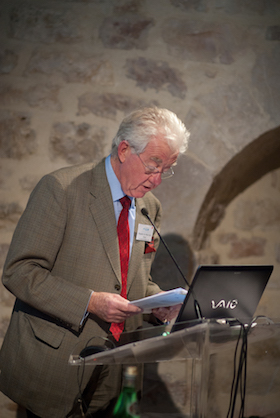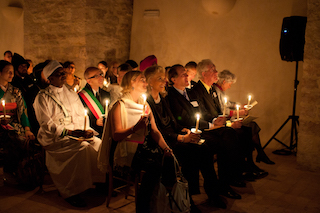| |
|
 |
Fond memories of our president, Sir Miles Hunt-Davis, who died last week
May 31, 2018:
 |
 |
 |
Sir Miles Hunt-Davis speaking at ARC's landmark 2011 Assisi meeting of religions on the environment PHOTO: KATIA MARSH |
We were so sad to hear that Brigadier Sir Miles Hunt-Davis died on 23rd May, at the age of 79.
Sir Miles became ARC’s international president in 2011, soon after he retired from his role as HRH's private secretary, a position he occupied for nearly 20 years, living for a while with his wife Gay in Nottingham Cottage in Kensington Palace, where Prince Harry and Megan now live.
Before that he served for many years with the 6th Queen Elizabeth's Own Gurka Rifles, stationed in Malaysia and Borneo, and from 1985 in Nepal, where he was Commander of the British Gurkas, and then in Hong Kong as commander of the Brigade of Gurkhas there.
In 1975, when he was Brigade Major 48 Gurkha Infantry Brigade in Hong Kong, he was, according to the official Gurkha obituary of Sir Miles, telephoned at home one Saturday lunchtime and tasked with receiving some 3,000 Vietnamese refugees by ship the following evening.
"These were the “boat people”, and by the next day the number had risen to 4,000. He stationed them on a polo ground, and the day afterwards the Gurkhas who had arranged this were duly on parade for the arrival of the Queen and Prince Philip."
"The key thing was the combination of extreme professionalism with a warm and friendly personality," said ARC's chairman Brian Pilkington. "And it was this fusion of characteristics that made him such a delightful person to work with."
 |
 |
 |
The candlelight opening of ARC's 2011 Assisi meeting. Right to Left: Rt Hon Sara Morrison, Brigadier Sir Miles Hunt-Davis, ARC chairman Brian Pilkington, Princess Michael of Kent, Victoria Finlay, ARC PHOTO: KATIA MARSH |
"He was highly resilient, and he was also fearless in sharing his opinions with everybody, including his former employer," he added.
"I enjoyed working with him immensely," said ARC's secretary general Martin Palmer.
"Not only when he was our president but long before, when I'd make my annual or twice-yearly visits to Buckingham Palace to visit Prince Philip [ARC's founder]. I'd always see Miles afterwards and he would laugh and say "What have you made him agree to do now!".
Interview with Sir MilesSoon after he had started at ARC, our communications director, Victoria Finlay visited him at his home in Warminster for an interview for our website. He talked about his work as British Commander in Nepal and Prince Philip’s private secretary, and about the importance of engaging religions in conservation issues. Here is an extract:
ARC: In the past 20 years you have seen a great deal of the conservation movement through your work with Prince Philip. What is your impression?
Sir Miles: "Conservation has played a major role in Prince Philip’s working life, and most of the time I was with him he was International President of WWF. So, especially in the first years I was lucky enough to spend a lot of time with him, travelling everywhere from the middle of Africa in the bush, to Siberia, to the tips and edges of parts of South America, to wherever. Working for somebody like Prince Philip, you get to hear a lot of questions being asked. He’s a great, “Why did you do that?” person. He is interested in an enormous number of things, from how motor cars are built to “why does this happen?” He has a hugely inquisitive nature. ...
If you are a man of such international prominence and you ask such questions then people have got to give you the answer. And very often, the first answer wasn’t good enough. If Prince Philip thinks you’re talking rubbish, he’ll say: “That’s not the answer. What is the answer? Have you tried it this way?” It was absolutely fascinating to watch this expert in action."
ARC: Had you much knowledge of conservation previously?
Sir Miles: "I was lucky enough to be the British Commander in Nepal for two years. The whole of that country is extremely poor. When you have people relying on crops from paddy fields the size of this room – if they’re lucky – and there’s no mechanised farming, then it’s hard, back-breaking labour. For those two years I also ran the Gurkha Welfare Trust. We had about 15 offices around the country where we provided a certain amount of funding for ex-soldiers who had become destitute. But more importantly we gave a degree of guidance in farming. Like anywhere else, unless you feed the land, you don’t get the same return on what you’ve sown and men who have spent their whole lives in the army need to learn this. So we ran resettlement courses to teach retired Gurkhas to stop being soldiers and to go back to being agriculturalists working at 4,000 to 7,000 feet above sea level. Or, if they’ve settled in the plain, we would teach them how to farm that kind of land properly."
ARC: Do you think that working with the faith leadership as well as the secular leadership is actually helpful?
Sir Miles: "Yes. Terribly. Because you immediately involve the average individual. Take, say, a peasant farmer in Nepal. When he sees the tie-up between his Hindu religion, his livelihood and making right use of nature, you can actually do quite a lot. You can help him use his religion to improve his farming, through giving him a greater sense of his agricultural responsibility. It’s got to be done with sensitivity and not in a complicated way, but there are very obvious, practical results. If you just grow rice and don’t feed the land or rotate the crops in some way, you are not going to get the returns you want on your investment. To put that across to peasant farmers, in parts of the world where the weather is awful and the soil is poor, is quite a challenge. But if you can relate it to the protection of the gifts given by our maker, whether it be Allah or a Hindu god, or Christ or whatever, you have a good hook on which to hang your coat."
ARC: Can you say a little about your life?
Sir Miles: "I was born in Johannesburg in 1938. My mother was South African: her mother was Scots, and her father went out from London for a ‘brave new world’. My own father was in the Australian Army in the First World War [he fought at Gallipoli] then settled in South Africa between the wars where he met my mother. My parents divorced when I was a boy and my brother and I went to school in Port Elizabeth. When I left school, academically not very successfully, I went to work for a British company in South Africa and then moved to the parent company in London.
I lived in a bedsit just off Sloane Square and was paid £10 a week, which was almost nothing even then. So I joined the Territorial Army to meet people and to make a bit of extra money because if you went to drill nights, you got paid something. I was in the Parachute Regiment as a private soldier and then I was commissioned into an infantry regiment called the Queen’s Royal Regiment, a very senior line regiment.
When I was about 24 I decided to become a regular officer. I was far too old to go to Sandhurst, so I joined as a three-year officer and I passed out as top cadet of my intake. While I was doing that I met the officer who ran the training. He said: “What regiment are you going to?” and I said I was going to the Queen’s Royal Regiment. He looked me up and down and said: ”No you’re not, you’re going to the Gurkhas…” So I went to the Gurkhas."
I had 29 years in the Gurkhas, ended up as a brigadier, served in Hong Kong, Nepal, Canada, Britain and was sort of the titular head of my regiment. When I left the army [in 1991] I was looking for a job, and the MOD rang me up and said would I be interested in a job at the Palace? I was having a lot of interviews at the time, so I said: “Yes. I’d love to.”
ARC: What do private secretaries do?
Sir Miles: "They run their principal’s office: all the correspondence, the finance and the engagements. They also accompany them on a certain amount of visits. Members of the royal family are always accompanied by a member of the office. In the Queen’s case, it is always a lady-in-waiting, the same with Princess Anne. With HRH it would either be myself or the young serviceman called the equerry-in-waiting [who serves for three years and is recruited in turn from the RAF, the navy and the army). And I was lucky because, especially in his role as President of WWF, he went to some remarkably interesting places, and some pretty dull conferences. But it was absolutely fascinating, he was a fantastic man to work for. We just got on with the job…" Read the full interview here.
Our deep condolences to Sir Miles' wife Gay, and his three children Jo, Justin and Ben.
|
 |
 |
|
|
|
|
|
 |
August 2, 2017:
The Duke of Edinburgh's last official engagement today
The Captain General's Parade at Buckingham Palace today was the Duke of Edinburgh's last official solo engagement. Since 1952 he has attended over 22,000 solo engagements. Some of them have been for ARC. |
 |
June 27, 2011:
Interview with Sir Miles Hunt-Davis
Sir Miles Hunt-Davis became ARC's international president in 2011. ARC's communications director, Victoria Finlay talked to him about his work as British Commander in Nepal and Prince Philip's private secretary for nearly 20 years, and about the importance of engaging religions in conservation issues. |
 |
May 12, 2018:
News from the 8th World Sikh Environment Day 2018
We've just heard from our friends at EcoSikh that the Eighth World Sikh Environment Day was the biggest ever.
It was celebrated by 5,100 Sikh Gurdwaras, institutions, schools and communities across India and all over the world on March 14, more than any other years since the beginning of celebration in 2011. |
 |
 |
|
|

